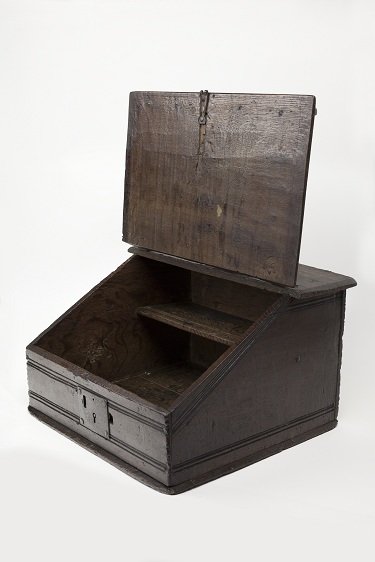Elizabeth Sharrett is a doctoral researcher at the Shakespeare Institute.
Antipholus of Ephesus: Give her this key, and tell her, in the desk
That’s cover’d o’er with Turkish tapestry,
There is a purse of ducats.
(The Comedy Of Errors 4.1.103-105)

Upon visiting Shakespeare’s Birthplace, many people often ask to see the desk where the famous dramatist wrote and stored his plays. They are surprised to learn that no such object exists, as the kinds of desks we are familiar with today did not appear until well after William’s death, at the end of the seventeenth century. If he did have a preferred place in which to keep his writings it was probably more likely a desk box, like this one now in the Shakespeare Birthplace Trust’s collection.
This object is from the early seventeenth-century, possibly about 1600. It is English, made of oak, and stands 25.5 cm high, 41 cm long, and 37 cm wide. Also called writing slopes, these portable structures were designed to sit on a lap or a table. Its body rests on a scrolled bookrest, and its front panel and sides are decorated with scratch moulding. Butterfly hinges at the top of the desk secure the slanted lid, and as Victor Chinnery notes in his book Oak Furniture, this design allowed convenient access to items stored inside the object without disturbing the writing or reading that may have rested on the top.
In the quotation above from Shakespeare’s play The Comedy of Errors Antipholus of Ephesus provides his servant Dromio with a fairly specific description of what to look for upon reaching the master’s home. In the process, he also supplies the audience with a possible snapshot of part of an early-seventeenth century domestic interior. In addition to the desk, he lists other household items – keys, a purse of ducats, and a Turkish tapestry covering the desk, perhaps similar to the table carpet considered by Victoria Jackson in Object Number 46, a table carpert. In spite of the fact that the play takes place in Ephesus, here Shakespeare appeals directly to the everyday objects found in many homes of the wealthier middling sort at the time.

Though this desk box was made for a reasonably affluent owner, one who possessed books and associated furniture (such as Antipholus of Ephesus) the object is relatively modest and decidedly more basic in form and style than the sophisticated parquetry chest discussed by Peter Hewitt in Object Number 52, a receipt chest. It represents the kind of practical object that might have been owned by the professional writers of Elizabethan and Jacobean England.
